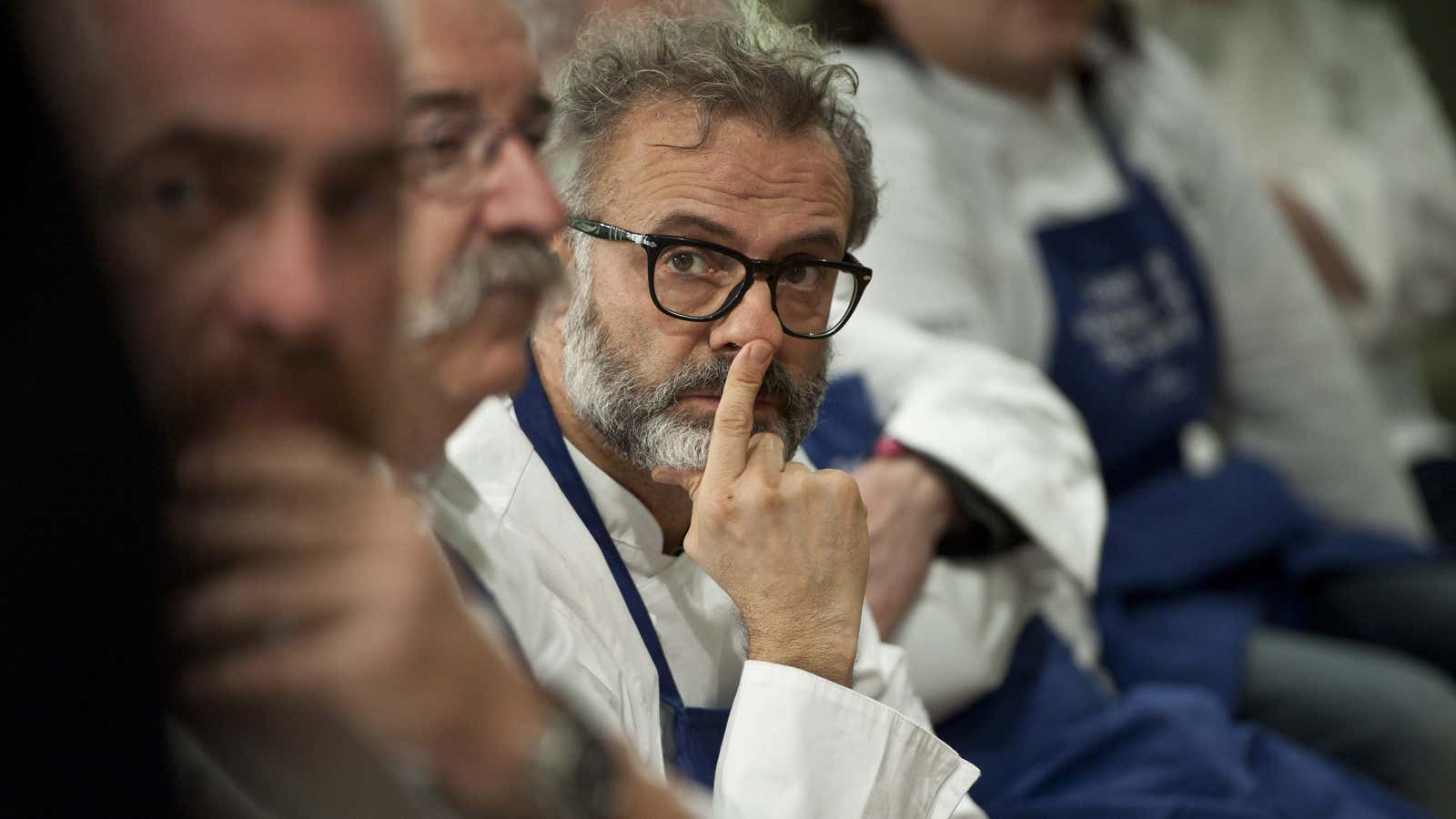Nearly 1,000 anonymous chefs, journalists, and “gastronauts” have voted Osteria Francescana, in Modena, Italy, the best restaurant in the world.
The fifteenth annual list of the World’s 50 Best Restaurants were just announced in New York City, and here are the top 10 restaurants:
1. Osteria Francescana, Modena, Italy
2. El Celler de Can Roca in Girona, Spain
3. Eleven Madison Park, New York City, USA
4. Central in Lima, Peru
5. Noma in Copenhagen, Denmark
6. Mirazur in Menton, France
7. Mugaritz in San Sebastián, Spain
8. Narisawa in Tokyo, Japan
9. Steirereck in Vienna, Austria
10. Asador Etxebarri in Axpe, Spain
The rest of the list can be found here.
Osteria Francescana, known for chef Massimo Bottura’s finely executed traditional Italian cuisine, has moved up the rankings to the top spot after being at No.3 in 2013 and 2014 and No. 2 in last year’s list. It displaced El Celler de Can Roca, last year’s top restaurant, which has moved to second place.
Copenhagen’s Noma is still at No. 5, despite the restaurant’s planned closure at the end of this year. (Conveniently, only restaurants that will close within three months of the awards announcement are excluded.)
Created in 2002 by the UK’s Restaurant Magazine, the 50 Best list has become a powerful competitor to the Michelin stars rating, and its release each year is the subject of intense speculation in the food world.
In recent years the list has also met some criticism, and this year was no exception. Occupy 50 Best, a group established ahead of last year’s list announcement, started a petition urging sponsors of the program (which include Diner’s Club, S. Pellegreno, and Lavazza) to stop funding the awards until the voting process becomes more transparent and balanced. They blamed sexism, politics, and conflicts of interest for results that have skewed male and European. The group’s petition boasts more than 800 signatures, including superstar chefs such as Joël Robuchon, Georges Blanc, and the Argentine chef Francis Mallmann.
In a rather dismissive takedown of the list in April, GQ’s Brett Martin wrote, “Although its makers insist that they publish a ranking of restaurants, not chefs, one glance at the gallery of winners on its website—a checkerboard of predominantly white-male head shots—tells a different story.”
Martin questioned the use of the word “best,” explaining that instead ”It is the list of the Instagrammed, the Snapchatted, and the Status Updated.”
The list’s selection process is intentionally opaque, with jury members, who cast seven secret votes each, kept mostly anonymous. There are several requirements that aim to keep the voting fair and unbiased by financial motives. Voters must prove they ate at a restaurant in the last 18 months, and that they don’t have a financial stake in any of the establishments they choose. But these requirements haven’t been enough to stop complaints about politics influencing votes.
While Michelin stars are awarded based on an established set of criteria, voters on the World’s 50 Best Restaurants list are allowed to exercise more subjective judgement. And the requirement that judges visit the restaurants they vote for in itself skews the results, former New York Times restaurant critic Frank Bruni told the New Yorker last November. “The judges invariably vote for places they’ve gone, because, whatever they happened to think of those places, they can’t vote for places they haven’t been,” he explained. As he knows better than most, taking in a wide selection of the world’s stand-out restaurants in 18 months is a tall order
This year, the presentation of the awards moved from London to New York’s Cipriani restaurant, and the USA had six restaurants in the top 50. Italy has four restaurants in the top 50. Spain had three in the top 10. Meanwhile, the rest of the world had sparser representation. In all of South America, five restaurants made the list, and six of Asia’s restaurants were in the top 50. One African restaurant was honored.
Correction: An earlier version of this story misstated the location of Mirazur. It is in Menton, France.
